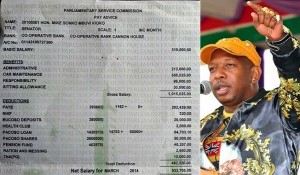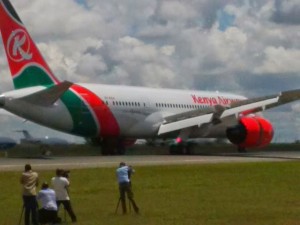- The Supreme Court rules for presidential petitions were tried and tested in 2013.
- Virtually every Kenyan is affected by some unresolved judiciary court case, whether it’s a commercial dispute, employment, land, traffic, inheritance, bank loans and so on.
- Disputes between borrowers and banks should not drag on for so many years that they incur legal, penalty and interest charges that eventually exceed many times the initial loan amount. From my notes while reading Charles Hornsby’s Kenya: A History since Independence, “15 petitions followed the 1969 elections and they were heard by Euro and Asian judges (Njonjo’s decision) – 3 were successful.” … “39 petitions followed the 1974 elections, and 9 MPs lost their seats, with 4 barred from contesting for 5 years.”… “The 1979 elections had no observers…31 petitions were heard by non-African judges and 9 MP’s (including 3 ministers) lost their seats”
- This year is expected to be no different and the Deputy Chief Justice was quoted as saying the courts were expecting as many as 300 petitions following the August 8 election.
Category Archives: Kenya parliament

Kenya Elections 2017 Wrap – Electionske2017
Yesterday, the final results of the August 8, 2017, Kenya elections (electionske2017) were announced by the Independent Electoral and Boundaries Commission (IEBC).
This came with the announcement of the presidential results that were delayed by challenges and agreement on the tallying and transmission of the results that were a spillover of lengthy discussions and court cases (the IEBC chairman said they had 200 court cases) on independent candidates, political party petitions, procurement, electronic gadgets, ballot papers, as well as the brutal murder of the IEBC technology manager just a week before the election.
Uhuru Kenyatta declared President elect after attaining 8,203,290 (54.27%) votes
— IEBC (@IEBCKenya) August 11, 2017
These were the fourth national elections in ten years (2007,2013, 2017 and a constitutional referendum in 2010) and they were closely contested in many places. Besides choosing a new president, 15 million Kenyans also voted on their choice for governor, senator, councillor (MCA), member of parliament (MP), and a county women’s representative from among 14,500 candidates.
But even after the results, there are expectations that dozens of petitions will be filed at the courts on Monday for determination.
Timely. Illuminating. Necessary.
👏🏾👏🏾👏🏾@dkmaraga @JUDICIARYKENYA pic.twitter.com/QVp7AykODa— Joyce Nyairo (@jnyairo) August 11, 2017
Electionske2017 Predictions:
- Opinion polls were reported in Kenya. They have been widely derided for not accurately predicting the outcome of races and for contradicting each other. This could be due to misunderstandings by Kenyans about what polls mean, and sampling methods used, especially in rural Kenya.
- Elsewhere, Charles Hornsby, author of the classic must-read Kenya: A History Since Independence -did a series of election prediction posts in June and early in August that were based on his September 2016 prediction of a 55-45 victory for Kenyatta over the (yet to be chosen at that time) opposition candidate remains plausible. He later revised this; I still predict a Jubilee victory by 52% for Kenyatta and Ruto to 48% for Odinga and Musyoka, with all others less than 1% combined.
- Another was a research report by Citibank (Citi) published in early August: On Thursday we hosted a call with Richard Kiplagat, COO of AfricaPractice, to talk through political scenarios. Mr. Kiplagat takes the view that 1) the polls are very close but give a slight edge to the President; 2) the victor is likely to win outright in the first round, given limited support for third party candidates; 3) while the outcome may be disputed initially, the Supreme Court is likely to certify the outcome by September 10th, a judgment that could well be accepted by the loser; 4) widespread or prolonged violence is unlikely this time around, due in part to devolution of the 2010 constitution and in part to the ethnic balance of the incumbent presidential/vice presidential ticket.
What happens next?
For President: The date of the swearing-in of the president constitutionally depends on if there are any petitions
- Petitions are filed within 7 days after the declaration of results
- If a petition is filed, the Supreme Court hears and gives a determination within 14 days
- The President-elect is sworn in the first Tuesday following the 14th day if no petition has been filed or the 7th day following the date on which the court renders a decision
For Governors’ transition rules
Breakdown of Parliamentary results by party strength #ElectionsKE2017 pic.twitter.com/hsmmoArD6x
— Arbitrum (💙,🧡) (@OleItumbi) August 10, 2017
For Members of Parliament: The 12th parliament i.e the national assembly and the senate are to have their first sitting, not more than thirty days after the elections (tentatively not later than September 8, 2017).
Also, see other electionske2017 posts about:
- subdued media
- election hacking
- a conspiracy of private investors interests
- election promise
- turnout, technology, and opinion polls
- Edit posts on the challenges faced by women political candidates
- Edit why I don’t vote
Governor and County Transition 2017
In July the Cabinet Secretary for Devolution and Planning gazetted rules for governor transition. Governors came into office in 2013, and this month, most of them stood for re-election as incumbents, for a second (and final) year term
About half of the 47 county governors in Kenya will be going home after losing in the August 8 elections and will be handing over power to new county governors.
The rules called for:
- All the counties (were to) form Assumption of Office of the Governor Committee(s) – these were largely made up of central government and county officials as well as with nominees from the incoming governor, once they have been declared the winners
- The committees are to facilitate handing over ceremonies, security of new governor, and communication and facilitation of a smooth transition.
- New governors are to be sworn in by a High Court Judge ten days after the declaration of results. The outgoing governor should be present to hand over symbols of power (but their absence shall not hinder the process).
- EDIT Where the outgoing governor is re-elected for a second term and upon signing the certificate of inauguration, the presiding Judge or the Deputy Registrar as the case may be shall hand over to the Governor any of the county symbols.
- The County Commissioner shall ensure the provision of adequate security during the conduct of the swearing-in ceremony.
- The committee shall within 30 days of swearing in provide a report on the:
- County Assets (offices, houses, schools, cars, computers, software investment, debtors etc. – their status and ownership documents)
- County liabilities (amounts & status of loans, legal liabilities)
- County bank accounts (reconciled balances)
- County Staff and county agencies
- Ongoing/multi-year projects and donor funded projects
- Pending litigation – by the county/against the county, and issues with other government agencies.
- Sources of county government funding for the last 4 years and projections for 2017/18.
KQ EGM 2017
Kenya Airways (KQ) held an EGM – extraordinary general meeting of its shareholders today in Nairobi. KQ Chairman, Michael Joseph opened the KQ EGM with a statement that this was essential to the future of the airline, as it restructured their debt and reduced their cash payments. He cited the origin of the airlines’ problem as the fleet expansion, ordering new planes back in 2005, that arrived later than expected, and soon after there were issues like terrorist attacks, economic decline, Ebola and the airport fire. This was at a time that there were a lot of state-owned Middle East airlines allowed to Nairobi who did not have a profit motive and who undercut their KQ’s prices.
He said the board had made responses such as offloading some aircraft to leases till the situation improved and they had also hired Sebastian Mikosz as CEO, who is a turnaround specialist.
Excerpts from the KQ EGM and the hour-long Q&A with shareholders
The Michael Joseph factor: Shareholders seem to have a lot of faith in Michael Joseph as a person to lead the turnaround. This is because of his legacy at Safaricom; he himself admitted as much in the challenge ahead of him, but he said that turning around KQ was much more complicated than Safaricom.
Hot button issues:
What Went Wrong? When it’s not clear what happened, Kenyans typically assign blame to corruption or mismanagement and several shareholders ask about a forensic audit query that had been done at KQ. Joseph said they had not forgotten the forensic audit, and he was going to clean the airline; he said that action had been taken with staff several dismissed or in court (He said justice was slow in the country cited a case where the former CFO had sued the airline and that case had not been heard a year later).
Payment to advisors; This came up several times and the figure cited was Kshs 1 5 billion. Joseph said the payment was a lump sum figure for the many advisors engaged in the complex restructuring deals. He cited Mckinsey as one case he was not happy and which had been terminated. Others were international competitively sourced and they had negotiated them down but had to pay.
Management ownership and staff pay: Shareholders asked the board and management to show commitment, by becoming shareholders. Joseph said he was a big investor at Safaricom and the KQ restructuring had an employee share ownership plan (ESOP) as part of the ownership plan, while disclosures about directors shareholdings would be forthcoming. Another shareholder asked the board and management to take a pay cut in line with what was expected of other employees.
Role of Government: Joseph said that the Government had allowed many new foreign airline flights to Kenya and that whenever the president visited abroad, other presidents asked if their airlines can fly to Kenya, or the tourism minister allows them to fly tourists to Mombasa – forgetting about KQ. Part of their future engagement with government will be on licensing of other airlines. On a question about nationalizing the airline, Joseph said that this had been ruled out and that KQ would remain a public company.
Banks left out to dry: Some shareholders asked if the banks agreed to the conversion? Banks lend depositors money to get it back and not for shares – and do not take KQ’s problems to other banks where this will make us miss dividends. There is a court case brought by some banks that will be ruled on August 10.
Fleet and performance CEO Mikosz spoke about monitoring the perception created in media about delays and cancellation at KQ and which unfairly gave the airline a bad impression. He said that flying 160 flights per days you expect 2-5% are expected to have some delays and this was standard in the aviation industry, but their stats were good.
Minority shareholders: Several minority shareholders said they had voiced issues at past AGM’s about high ticket prices, low dividends, and other issues who had been ignored and who were told that the airline was alright. Michael Joseph said he was an independent director and he and others were there to look out for minority shareholders.
Shareholders at the KQ EGM unanimously voted for the lengthy balance sheet restructuring that was done in a single vote.
Another circular will be issued with terms for shareholders investing afresh in the airline.
The next meeting will be a regular shareholder’s AGM on September 21.
KQ EGM swag: transport to/from town, t-shirt, packed lunch by NAS.
WDR 2017: Governance and the rule of law
WDR2017, the World Development Report from the World Bank for 2017, looks at governance and the rule of law around the world and how they can impact countries and economic development.
some excerpts;
- Elections alone are not enough to bring change – even when citizens manage to remove politicians whose performance is poor or diverges from their preferences, elections alone offer no credible guarantee that, once elected, new leaders will not shirk their electoral promises and credibly commit to citizens’ demands.
- Local elites can capture public spending despite participatory programs; as they can disproportionately sway expenditure decisions
- Inequality begets inequality In societies in which inequality is high as the effectiveness of governance to deliver on equity outcomes can be weakened structurally because those at the top of the income ladder not only have control over a disproportionate amount of wealth and resources, but also have a disproportionate ability to influence the policy process.
- Devolve: By multiplying the number of more or less autonomous arenas within which public authority is exercised, decentralization increases the opportunities for policy innovations and the emergence of effective leaders. Often these innovations are spurred by political outsiders, who may not have access to the national policy arena but are more likely to acquire citizen support locally and spur local institutional reforms.
- Female leaders are less prone to patronage politics and corruption.
- Media content is often defined by elites leading to a bias, but new media can counteract this.
- Political parties are on average the least-trusted political institution worldwide
- Politically connected firms gain undue advantage in countries through using market regulations to favor firms, granting import licenses to favored firms, and diverting credit.
- Land redistribution policies often fail due to transaction costs, incomplete contracts, and political agreements.
- The Panama Papers highlighted legal and illegal ways in which assets found their way to 40 countries: Funds are legally earned through tax evasion and evading currency controls and shifting profits, but also illegally by exploiting natural resources, violating intellectual property rights, corruption, embezzlement, drug trafficking, and human smuggling etc.
See the 2016 WDR report.


